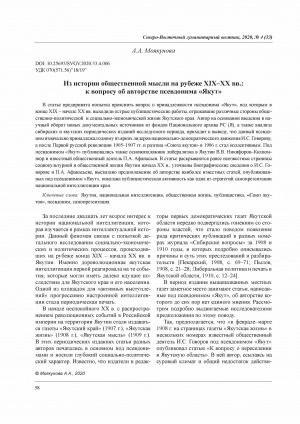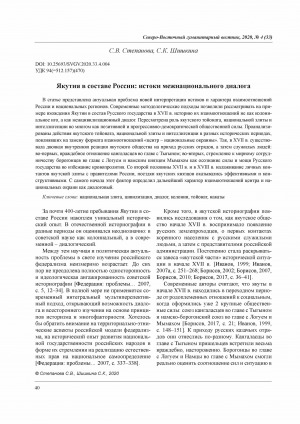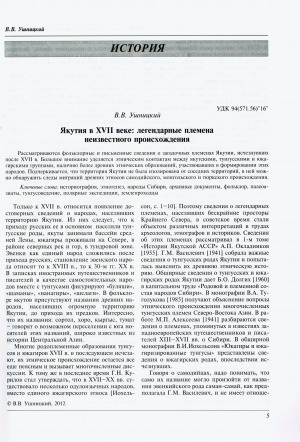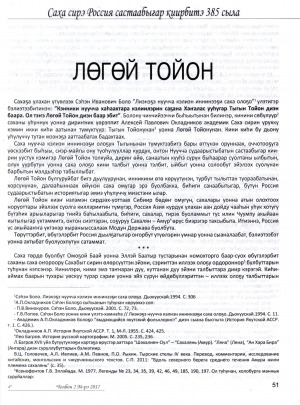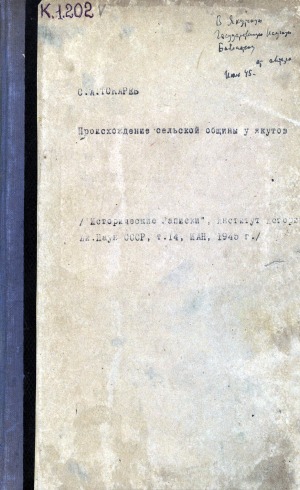Количество страниц: 6 с.
- Общественные науки. Образование > Экономика. Экономические науки. Политическая экономия > Торговля. Международные экономические отношения. Мировое хозяйство,
- Краеведение. Археология. География. Биографии. История > Историческая наука. Историография > История Якутии > Якутия в XVI-XVIII вв.,
- Краеведение. Археология. География. Биографии. История > Историческая наука. Историография > История Якутии > Якутия в XIX в.,
- НАУКА ЯКУТИИ > КРАЕВЕДЕНИЕ. ГЕОГРАФИЯ. БИОГРАФИИ. ИСТОРИЯ > Историческая наука. Историография > Всеобщая история > История Якутии,
- НАУКА ЯКУТИИ > ОБЩЕСТВЕННЫЕ НАУКИ > Экономика. Экономические науки. Политическая экономия.
Николаев Д. А. Из истории торговли мамонтовой костью в Якутии (XIX – нач. XX в.) / Д. А. Николаев // Северо-Восточный гуманитарный вестник. - 2019. - N 4 (29). - С. 35-39. – DOI: 10.25693/SVGV.2019.04.29.04.
DOI: 10.25693/SVGV.2019.04.29.04
Количество страниц: 8 с.
- Краеведение. Археология. География. Биографии. История > Историческая наука. Историография > История Якутии > Якутия в XVI-XVIII вв.,
- Краеведение. Археология. География. Биографии. История > Историческая наука. Историография > История Якутии > Якутия в XIX в.,
- НАУКА ЯКУТИИ > КРАЕВЕДЕНИЕ. ГЕОГРАФИЯ. БИОГРАФИИ. ИСТОРИЯ > Историческая наука. Историография > Всеобщая история > История Якутии.
Моякунова, А. А. Из истории общественной мысли на рубеже XIX-XX вв.: к вопросу об авторстве псевдонима "Якут" = From the History of Social Thought on the Edge of the XIX-XX Centuries: to the Questions of the Authorship of the Pseudonym "Yakut" / А. А. Моякунова // Северо-Восточный гуманитарный вестник. — 2020. — N 4 (33). — C. 58-64. — DOI: 10.25693/SVGV.2020.33.4.006.
DOI: 10.25693/SVGV.2020.33.4.006
Количество страниц: 6 с.
Степанова, С. В. Якутия в составе России: истоки межнационального диалога = Yakutia as the Part of Russia: the Origins of Interethnic Dialogue / С. В. Степанова, С. К. Шишкина // Северо-Восточный гуманитарный вестник. — 2020. — N 4 (33). — C. 40-45. — DOI: 10.25693/SVGV.2020.33.4.004.
DOI: 10.25693/SVGV.2020.33.4.004
Количество страниц: 4 с.
The article examines the folklore and written information about mysterious tribes of Yakutia who disappeared after the 17th century. Big attention is paid to the ethnic contacts between the Sakha, Tungus and Yukagir groups, to the availability of the more ancient ethnic formations which participated in forming of these peoples. It is emphasized that the territory of Yakutia was not isolated from neighboring territories. Here, one one can discover the traces of migrations of the ancient ethnoses of Samodian, Mongolian, Turkic origin.
Ушницкий, В. В. Якутия в XVII веке: легендарные племена неизвестного происхождения=Yakutia in the 17th century: legendary tribes of unknown origin / В. В. Ушницкий // Северо-Восточный гуманитарный вестник. – 2012. – N 2 (5). – С. 5-8.
Источник: Чолбон. - 2017. - N 2
Количество страниц: 26 с.
Источник: "Исторические записки", Институт истории Академии Наук СССР, т. 14, ИАН, 1945. - С. 169-201
Количество страниц: 42 с.
Количество страниц: 10 с.
- Якутская Степная дума – первый опыт областного самоуправления > Исторические предпосылки создания Якутской Степной думы,
- Общественные науки. Образование > Государственное административное управление. Военное дело,
- Краеведение. Археология. География. Биографии. История > Историческая наука. Историография > История Якутии > Якутия в XVI-XVIII вв.,
- НАУКА ЯКУТИИ > ОБЩЕСТВЕННЫЕ НАУКИ > Государственное административное управление. Военное дело.
The article focuses on an important period in the history of local administration in Yakutia when indigenous self-government was formed. The author considers formation of the vertical power structure both in regional administration (commandants, commissioners, judicial authorities, assessors) and in potestary institutions and forms of selfgovernment in Yakutia (ulus chiefs, princelings). The author applies comparative method in research. For the first time the hierarchy between various structures of local government and indigenous self-government in Yakutia is analyzed considering dynamics of their formation. Before the provincial reform of 1775 in Yakutia the forming indigenous selfgovernment was opposed to the local government. Undertaking the reform required much effort. It was inappropriate to implement general methods in local conditions. The Yakuts insisted on direct subordination to the administrative and judicial authorities of the Yakut regional administration.
Борисов, А. А. Якутское областное управление и инородческое самоуправление: формирование вертикали власти (1775–1810-е гг.) / А. А. Борисов // Известия Иркутского государственного университета. Серия: История. – 2018. – Т. 23. – С. 6-15.
Количество страниц: 7 с.
- Якутская Степная дума – первый опыт областного самоуправления > Учреждение и деятельность Якутской Степной думы (1827-1838 гг.),
- Республика Саха (Якутия): пути великих свершений > Присоединение к России,
- Общественные науки. Образование > Государственное административное управление. Военное дело,
- Краеведение. Археология. География. Биографии. История > Историческая наука. Историография > История Якутии > Якутия в XVI-XVIII вв.,
- Краеведение. Археология. География. Биографии. История > Историческая наука. Историография > История Якутии > Якутия в XIX в.,
- НАУКА ЯКУТИИ > ОБЩЕСТВЕННЫЕ НАУКИ > Государственное административное управление. Военное дело.
The purpose of the presented article is to consider the role of Yakut deputations in the formation of alien (inorodcheskoe) legislation ("steppe laws"). We contribute the following tasks to achieve this goal: 1) to revise the former estimates of these trips which were interpreted as achieving the narrow corporate (class) interests of the Yakut elite, 2) to characterize the prerequisites and reasons for organizing the deputies, 3) to trace the stages in the development of this movement, 4) to test the thesis about the role of deputies in the formation of alien legislation. The research methodology is based on the concept of multiculturalism policy implemented in the Russian Empire. Legal pluralism became one of the peculiarities of ethnic-confessional policy of the Russian Empire. On the one hand, there was acting official state law, and on the other hand, there was a customary law. The problematic field of research is in the historical and legal space and includes some categories related to the history of Russian legislation on the example of Yakutia. The historical sources of research were the tsarist and Senate decrees, documents of local authorities, artifacts of Yakut customary law. In the course of the research, the author came to the following conclusions. 1) It is very important that deputy trips from the local ethnic elites, in particular, from Yakuts had a major role in the creation of laws for Siberian aliens. The Yakut elite leaders came to the understanding that only a set of measures and, above all, the adoption of legally recognized "steppe laws" could serve as a guarantor o f stable development of the Yakuts. 2) In article the history of yakut deputations was divided on three periods: the first, preparatory (17891811), the second, reformatory (1811 - the middle of 1820s), the third, the struggle for the establishment of "steppe laws" (1829-1840s). 3) The most important outcome of the trips was the formation of "steppe laws" body, known as "Code of nomad ic aliens of Eastern Siberia". On the agenda there was a question of establishment a proper set of laws for aliens, which would regulate all aspects of life of the peoples of Siberia. 4) Although the "Code" was not officially approved, but the practice of the relationship between the imperial government and aliens' leaders demonstrates that the open mutual dialogue had been developing. There was the process of searching the optimum forms of governance that provides an invaluable historical experience.
Борисов, А. А. Якутские депутации и инородческое законодательство как одна из особенностей политики Российской империи на северо-востоке (конец XVIII - первая половина XIX в.) / А. А. Борисов // Вестник Томского государственного университета. История. – 2018. – N 56. – С. 5-11.
DOI: 10.17223/19988613/56/1
Количество страниц: 5 с.
- Якутская Степная дума – первый опыт областного самоуправления > Исторические предпосылки создания Якутской Степной думы,
- Общественные науки. Образование > Государственное административное управление. Военное дело > Низшая ступень органов управления. Местное управление. Общинное управление,
- Краеведение. Археология. География. Биографии. История > Историческая наука. Историография > История Якутии > Якутия в XVI-XVIII вв.,
- Краеведение. Археология. География. Биографии. История > Историческая наука. Историография > История Якутии > Якутия в XIX в.,
- НАУКА ЯКУТИИ > ОБЩЕСТВЕННЫЕ НАУКИ > Государственное административное управление. Военное дело.
In the history of local government in Russia there were periods when important changes took place. Different factors influenced the process of searching for optimal forms of management organization. This work is devoted to studying these factors on the example of Yakutia in 1775-1805. On the one hand, the interests of centralization of the growing Empire, and on the other hand, the peculiarities of the national regions were influenced. For Yakutia, the provinceas an acceptable form of government was chosen, but it was preceded by a relatively long and contradictory transition period.
Борисов, А. А. Переходный период в истории местного управления в Якутии в 1775–1805 гг. / А. А. Борисов // Столица и провинции: взаимоотношение центра и регионов в истории России. – Санкт-Петербург, 2018. – Вып. 9. – С. 157-161.
Количество страниц: 9 с.
The article discusses the problem of special forms of government on the outskirts of the Russian Empire in the end of 18th - the middle of 19th century on the example of the Yakutsk region. The secular authorities are considered: the regional head, the governor, the regional government, their relationship with foreign structures, as well as the spiritual governing bodies. There were demonstrated the evolution of state institutes involving comparative data. Attention is drawn to the main causes and factors that influenced the emergence of features in local government.

